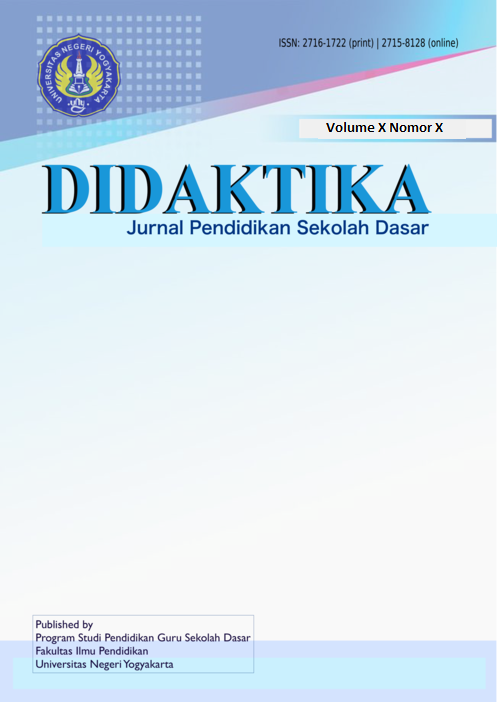Eduwisata Learning Planning Based on Sunan Muria Character Score in SD 3 Piji, Kudus District
DOI:
https://doi.org/10.21831/didaktika.v6i1.41137Abstract
References
Anna, F. (2014). Sekolah yang Menyenangkan. Bandung: Nuansa Cendekia.
Bahrudin, B., Masrukhi, M., & Atmaja, H. T. (2017). Pergeseran Budaya Lokal Remaja Suku Tengger di Desa Argosari Kecamatan Senduro Kabupaten. Journal of Social Studies, 6(1), 20 -28.
Borg, W.R. and Gall, M.D. 1983. Educational Research: An Introduction. London: Longman, Inc.
Dewi, N., Hasmiana, H., & Mahmud, A. (2016). Perilaku Bullying yang Terjadi di SD Negeri Unggul Lampeneurut Aceh Besar. Jurnal Ilmiah Pendidikan Guru Sekolah Dasar, 1(2), 37-45.
Ekowati, & D. W. (2012). Model Pembelajaran Pendiidikan Karakter Pada Pembelajaran Tematik di SD Muhammadiyah 9 Kota Malang. Jurnal Humanity, 8(1), 117 - 127.
Erikson. (1968). Identity: Youth and Crisis. New York: Norton.
Hasanah, A. (2012). Pengembangan Pendidikan Karakter Berbasis Kearifan Lokal Pada Masyarakat Minoritas (Studi Atas Kearifan Lokal Masyarakat Adat Suku Baduy Banten). Jurnal Analisis, 12(1), 209-228.
Hidayat. (2011). Pentingnya Pendidikan Karakter di Sekolah dasar di Indonesia. Jakarta: LPI- DD.
Muhanifah. (2020). Peran Pesantren dalam Meningkatkan Kecerdasan Interpersonal Santri Melalui Kegiatan Eduwisata (Studi Kasus di Pesantren Enterpreneur Al Mawaddah Kudus). Jurnal Quality, 8(1), 15-38.
Purwanto, S. (2016). Pendidikan Karakter Melalui Seni. Yogyakarta: Yogyakarta.
Sakinah, D. N. (2018). Perilaku Bullying terhadap Anak Berkebutuhan Khusus di Sekolah Inklusif Kota. Jurnal Penelitian Pendidikan Kebutuhan Khusus, 6(2), 1-6. Simbolon, M. (2012). Perilaku Bullying pada Mahasiswa Berasrama. Jurnal Psikologi, 39(2), 233. 243.
Sumayana, Y. (2017). Pembelajaran Sastra di Sekolah Dasar Berbasis Kearifan Lokal (Cerita Rakyat). Mimbar Sekolah Dasar, 4(1), 21–28.
Wariin, I. (2014). Nilai-Nilai Kearifan Lokal (Local Wisdom Adat Memitu Pada Masyarakat Cirebon (Studi Masyarakat Desa Setupatok Kecamatan Mundu). Edunomic Jurnal Pendidikan Ekonomi, 118-127.
Yunarti, Y. (2014). Pendidikan Ke Arah Pembentukan Karakter. Jurnal Tarbawiyah, 11(2), 262-278.
Downloads
Published
How to Cite
Issue
Section
Citation Check
License
- Authors retain copyright and grant the journal right of first publication with the work simultaneously licensed under a Creative Commons Attribution License that allows others to share the work with an acknowledgement of the work's authorship and initial publication in this journal.
- Authors are able to enter into separate, additional contractual arrangements for the non-exclusive distribution of the journal's published version of the work (e.g., post it to an institutional repository or publish it in a book), with an acknowledgement of its initial publication in this journal.
- Authors are permitted and encouraged to post their work online (e.g., in institutional repositories or on their website) prior to and during the submission process, as it can lead to productive exchanges, as well as earlier and greater citation of published work.






